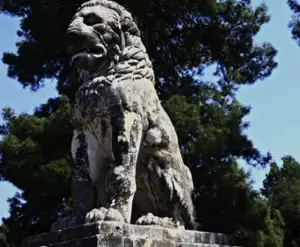This can cause us all to hope that maybe Alexander the Great wasn’t actually like the emo rent-boy portrayal Brad Pitt gave him in the unwatchable Troy: Alexander the Gay.
The Telegraph reported a while back on an archaeological discovery dating from circa 300 BC. And they think it was the tomb of some Macedonian bigwig.
Archaeologists in Greece have discovered a vast tomb that they believe is connected with the reign of the warrior-king Alexander the Great, who conquered vast swathes of the ancient world between Greece and India.
The tomb, dating to around 300 BC, may have held the body of one of Alexander’s generals or a member of his family. It was found beneath a huge burial mound near the ancient site of Amphipolis in northern Greece.
Antonis Samaras, Greece’s prime minister, visited the dig on Tuesday and described the discovery as “clearly extremely significant”.
A broad, five-yard wide road led up to the tomb, the entrance of which was flanked by two carved sphinxes. It was encircled by a 500 yard long marble outer wall. Experts believe a 16ft tall lion sculpture previously discovered nearby once stood on top of the tomb.
They ruled out the possibility that the tomb could be that of Alexander – the emperor is believed to have been buried in Egypt after he died of a fever in Babylon in 323BC.
via Vast tomb unearthed in northern Greece – Telegraph.

The tomb was once “guarded” by these two remarkable sphinxes, who were decapitated by long-gone barbarians.
Since that report, more has been unearthed (both literally and figuratively), and archaeologists have made the not unexpected discovery that the tomb was plundered in ancient times, and that at least some of the guardian statuary was defaced by iconoclasts, perhaps during the long dark night of Greece’s occupation by the marginally-civilized Ottoman Empire.
A more recent article is here in the Daily Mail. It contains more information on the excavations, and was the source of the images that we have reprinted here. While the text of the article is interesting, we were particularly intrigued by this interesting comment:
Antipater was one of the few people who died in Greece around the estimated time the tomb was constructed, and was important enough to rate a tomb of this one’s size. He was a general for Alexander’s father, Philip II, and then was Alexander’s regent for Macedonia, and Strategos of Greece. In that capacity he crushed Sparta once and for all at the Battle of Megalopolis. Later, after Alexander’s death, he became regent of the empire, and guardian of Alexander’s infant son, and his brother. Had he lived longer, the history of Western Civilization might have been very different. He died in 319 BC.
There is not enough information out there yet to identify the tomb to any single individual, but that’s a credible suggestion.
Wait, Alexander had a son? The Brad Pitt version couldn’t have done that.

Kevin was a former Special Forces weapons man (MOS 18B, before the 18 series, 11B with Skill Qualification Indicator of S). His focus was on weapons: their history, effects and employment. He started WeaponsMan.com in 2011 and operated it until he passed away in 2017. His work is being preserved here at the request of his family.


7 thoughts on “Tomb May Provide Clues to Alexandrine Macedonia”
In all fairness, Brad Pitt played Achilles in the movie Troy. Colin Farrel played the part of Alexander in the movie Alexander.
And despite whatever flaws the move Alexander had (I watched only about half), I appreciated the live action depiction of the battle of Gaugamela for its attempt at authenticity. I think that alone makes the movie worthwhile.
perhaps someday Alex the Great’s actual tomb will be found. He sleeps with the fishes, somewhere in that part of Alexandria, Egypt, which is currently offshore, under the rising waters. Maybe during the next Ice Age
History is a great teacher. And those of us who ignore it take the dirt map first. Not to belittle the fascination of such pivotal events in human history, It is tyranny all the same to me. Deification of tyrants. It perpetuates the ruse of legitimacy of those in power.
Look no further than the chocolate emperor and his ilk running the regime today that passes for government. They are deifying the same tyranny in real time.
It is time to , and very much within the power of our consent and the lessons history teaches us to change that.
Personally for me it is the classical thinking which grew from the 5000 years of history of tyrannies, such as Alexander’s reign of power, that great leap in thinking which gave us blood thirsty humans for the first time a place where liberty and not tyranny was sanctioned as the determining factor of a nation state. And all without the need for its survival the sacking and plundering of other peoples and places. But my how that has changed, how that great leap has come around almost to full circle because of Alexander’s of the world we have today, it is time to change the equation again.
Tyrants are interesting, at least from a remove of X millennia.
Amused by your literary reference, good story. Think “the Viking” spelled it “Boone,” though?
The Spartans were bisexual. Lived with their special bunk buddy and still managed to have children. From what I’ve read they fought fairly well too. It would be interesting to find out how they managed that as today’s sexual deviants aren’t worth a bucket of piss in the fighting department.
The Spartans weren’t allowed to marry until they were 30. I guess the figured they needed to do something to constructively channel all that pent up sexual desire. I read where a bride sometimes had to be given a fake beard so the guy would want to do something with her on their wedding night.
The Spartans weren’t allowed to marry until they were 30.
You got it wrong. They were allowed to marry, but they weren’t allowed to live with their wife until they turned 30 and became something more like reserve soldiers.
That Spartans were pederasts is pretty much unclear.
What is clear is that pederasty was the norm in every other Greek city state. Furthermore, the only writings we have on Sparta that were contemporary were those put down by their enemies.
Plutarch( a later writer), for example, denies that Spartans were pederasts, or even as bisexual as other Greeks(who at the time had a quite Islamic attitude towards women – they kept them at home, didn’t allow them to go out much, dress immodestly, get education etc). Sparta was the complete opposite of that, they even allowed women to own property, get education and so on.
There was the Sacred Band(?) of Thebes which was another state’s elite military unite in which homosexuality was required.